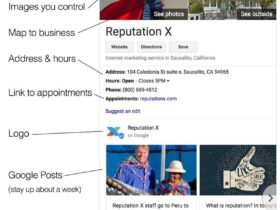
This guide will teach you how to keep a good reputation, whether you’re focusing on your personal brand reputation or professional reputation.
The Latin writer Publilius Syrus said, “A good reputation is more valuable than money.” And while Syrus was alive from 85 to 43 BC, somehow, this quote is most relevant today.
You’ve worked hard to establish a solid and trusted company reputation and brand with loyal customers. Yet maintaining a stellar business reputation takes vigilance and a concerted business reputation management strategy.
Negative reviews or missteps can tarnish a business’s reputation. All that goodwill you’ve created over time can be ruined instantly in the age of social media. You may lose customers, revenue, and, most importantly, trust.
In this article, we’ll explain how to keep the great reputation you’ve already achieved. You can also call us at
(844) 458-6735
for an in-depth audit and valuable insights from expert reputation managers.
What Is a Positive Reputation?


One’s reputation is often based on external perceptions — how people (including the public, stakeholders, and competitors) perceive you, your personal brand, and your company brand.
It begins with how you define your business, including your brand’s…
- Core values
- Corporate culture
- Mission statement
- Value proposition
All of these elements should also be shared with and embraced by everyone throughout the company. According to business expert and professor Dr. Gary Davies, a large part of a company’s reputation comes from what its employees think of the brand.
Your core values may include integrity, transparency, empowerment, or trust. These values are conveyed throughout the company in a number of ways, including:
- Branding: Name, logo, tagline, design, company voice, tone
- Marketing: Emails, press releases, social media
- Online Presence: Blog, website, Google reviews and other online reviews
Your corporate communications and customer service play a role, too. Overall, a positive reputation is perceived as trustworthy, credible, reliable, and desirable.
The Importance of a Good Business Reputation


A good business reputation provides you with key advantages:
It helps you build trust and customer loyalty. Customers will continue to buy your products and services even during difficult economic times. Oftentimes, people are loyal to those they can rely on repeatedly and whose company’s reputation is impeccable (or at least close to it).
Customers will become your advocates. Those with a great customer experience will tell friends and family about your products and services. They’re also more likely to write positive reviews and give your company five-star ratings.
Depending on the type of business you own, customers may even become influencers for you, especially if your target demographic is younger and scrolls through Instagram and other social media platforms day in and day out.
Your company is better able to help your human resources department in attracting prospective employees and retaining top talent. People want to work for companies with an excellent business reputation. Candidates will research your business reputation online before applying for a position to see whether you have a good reputation in the industry.
Here are a few more benefits of having your business held in high regard:
- You’ll gain a competitive edge and strong market value. This will enable you to distinguish your brand from others in your niche industry.
- You’ll see increased revenue and profits. Companies with a positive business reputation and higher ratings online get more business.
- A solid company reputation will help you withstand negative reviews and a potential PR crisis. It will also help you face reputational risk as a result of an incident or mishap.
Take the first step toward fortifying your brand’s reputation. Give us a call at
(844) 458-6735
to learn more.
The Internet’s Impact on a Positive Digital Reputation


In the past, businesses communicated and maintained their company’s reputation with television ads, print ads, and, of course, excellent customer service and word of mouth (referrals). But the internet and social media have changed much of this.
People, of course, still expect and demand excellent service, but they can now access all kinds of information online before deciding to do business with your company.
Businesses are under a microscope, and every action and inaction is scrutinized. Consumers read online reviews, conversations, and negative feedback (about a product, service, or an individual at the company) and visit review sites to gain insight into what customers love about a company and what they don’t like.
A company’s reputation can be damaged easily with one viral social media post or an influx of negative reviews. Therefore, it’s critical to have a solid online business reputation management strategy in place.
Gen Z and Millennials: How Much They Depend On a Company’s Reputation


While everyone wants to do business with a company with a good reputation, this is particularly important for Gen Z and millennials, who rank reputation importance at the top of the list.
Every decision they make involves looking online first, including social media posts and comments. They will check out your company’s online reputation to get an idea of the brand’s authenticity and transparency, along with the business’s ESG (Environmental, Social, and Governance) initiatives.
If there have been any missteps throughout the company’s history, these generations want to see how the brand managed them.
- Was the business forthright?
- Did the business immediately issue a statement that said it was directly responsible for the misstep?
- Did the business apologize and seek to improve where it may have gone wrong?
The same goes for personal reputations: Are individuals taking responsibility and explaining the facts around an incident that reflects poorly on them?
No doubt, in the age of social media and gotcha journalism, a company’s online reputation is critical to its continued success.
How To Maintain a Positive Reputation Online Personally or Professionally


A strong reputation management program can maintain your business reputation. A business reputation management strategy is designed to boost and protect your online reputation.
An experienced online reputation management (ORM) company can manage your online reputation along with your internal reputation management department, if one exists. Smaller companies that don’t have internal resources should turn to a business reputation management company for managing their corporate reputation online.
The Basics: Online Reputation Management Strategies To Start With


Reputation management in today’s digital era involves the following initial strategies:
Begin by Googling your company name to see what comes up. Note positive and negative results. Are most of the search results positive? Or is there negative information coming up that will damage your reputation?
Monitor search results for your brand keywords, paying particular attention to new reviews, conversations, and comments.
Visit review sites to see what customers are writing. Thank those who are saying positive things, and address any negativity.
Regarding negative reviews or comments, address any issues that are causing problems and resulting in dissatisfied customers. Respond politely to negative comments promptly. Don’t get frustrated even if you know what is being said is not valid.
Creating and Marketing Positive Content for Reputation Protection and Management


To protect your business online, a reputational management company will develop a strategy that incorporates developing and marketing positive content. This strategy is employed by many in the business world for the following purposes:
- Impact brand reputation in creative ways
- Avert potential threats you may be concerned about
- Deal with a PR disaster to minimize reputational risk
- Rebuild trust with your target audience
For the purpose of content marketing, write articles — or have articles ghostwritten for you — on topics that are relevant to your business and your expertise. Strive to have these articles published in popular outlets like Entrepreneur, Fast Company, Forbes, and others to establish yourself as a thought leader.
The more articles you have published, the more positive content will appear in searches. Any negative results in search will eventually rank lower on the page and “disappear” with the right strategy.
More Content Marketing Strategies


Write articles sourcing you as the expert and have them posted on authoritative sites and multiple channels with links to your LinkedIn profile, X account, Facebook, and other platforms.
- Optimize your website, including your About Us page and bio, for SEO keyword phrases.
- Include imagery related to your brand’s mission and optimize the photos with keyword phrases as well.
- Post to your website weekly. This will help boost your search rankings with positive content related to your business.
- Update your business page everywhere — on Google, LinkedIn, and all social media platforms.
- Post positive things regularly on social media about your company, along with promotional messages that engage your customers
- Ask your happy customers to leave honest reviews on sites that are pertinent to your business, like Tripadvisor, Angi, Google, Amazon, and the Better Business Bureau (BBB).
By regularly creating and marketing content, your customers will learn more about what you are doing and have to offer. You will also drive more traffic to your site. Plus, this is a great way for your own employees to better understand your business and values.
Regular Monitoring and Maintenance: A Good Reputation Strategy Is Ongoing


Keeping your reputation positive is essential to your success, and it should always be a priority. Remember, building a reputation is not a one-and-done deal. Any bad news can ruin a company and its reputation. That’s why you want to consistently be on top of creating positive news and content about your business and engaging with your customers and stakeholders.
Being engaged means looking at the important facets of your company and determining what you should feature when developing content that resonates. Some tactics come with lower costs than others, like asking your customers for reviews. This doesn’t cost a thing but will go a long way in building and maintaining your company’s reputation.
If you’ve had some bad press, you may consider getting a couple of focus groups together to determine how best to address any negativity via press releases, advertising, social media, and other methods. You may also decide to hold a video conference to speak directly to your customers and stakeholders. Also, since actions speak louder than words, be sure your body language is in sync with what you are saying. Honesty is key.
Reputational risk is a critical issue that all companies need to manage. Without a positive reputation and the right digital tools to create and manage an ORM strategy, your brand could suffer.
It’s common for consumers and stakeholders to question everything about a business — its products and services, market values, and operations. It’s in your best interest to be prepared with an expert-designed ORM strategy.


Keeping a good reputation is complex and challenging, whether you are a business owner or an individual. The process has to be comprehensive — you can’t do the bare minimum, hope for the best, and expect your reputation to rise to new heights.
Your digital reputation strategy must include not just your website but also a variety of outlets (such as review sites) that tend to rank highly across industry searches.
A reliable partner may be just what you need to get started. From 24-hour monitoring to upscale content creation and promotion, our team of ORM experts can help you create the online presence you deserve.
Contact Reputation Sciences today at
(844) 458-6735
for more information.
















Leave a Reply